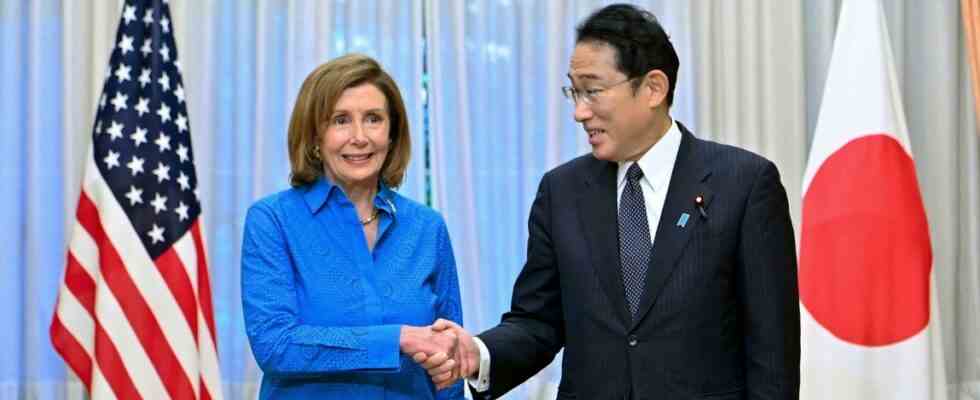So on Friday, Nancy Pelosi flew home after a trip around Asia that was pretty exciting for everyone in the region. But before her plane took off for Washington, the speaker of the US House of Representatives still had a lot to do in Tokyo.
She spoke to Japan’s Prime Minister Fumio Kishida about the tense relationship with China and joint efforts to ensure security and stability. She demonstrated unity at the photo shoot. She listened as Kishida told her about the five rockets China fired into Japan’s exclusive economic zone during military exercises following her visit to Taiwan on Thursday. And she gave a press conference in which she indirectly said that China’s government was exaggerating in its reactions to Wednesday’s trip to Taiwan.
“We’ve said from the beginning that our show here isn’t about changing the status quo in Taiwan or in the region,” Pelosi said. She also warned China: “You will not isolate Taiwan by preventing us from traveling there.”
So Nancy Pelosi showed what the free world dares to do when standing up for its values in contested territory. A strong sign. Nevertheless, you couldn’t make it too easy for yourself with the applause for the determined democrat. Japan and South Korea, the other US ally in East Asia, are likely to feel the effects of Pelosi’s visit for some time. China counts the democratically governed Taiwan as part of its sovereign territory. Pelosi’s visit there was an affront to Beijing. And China’s anger is a problem for Japan and South Korea. Firstly, because China is an important economic partner for Japan and South Korea. Second, because of the security situation, which is already tense in the East China Sea; Japan and China are fighting over the Senkaku and Diaoyu Islands.
In South Korea, Pelosi was received rather coldly. There was no meeting with President Yoon
Kishida has not publicly commented on Pelosi’s visit to Taiwan. But he certainly wasn’t thrilled about it. And in Seoul, too, comments were reserved. In the South Korean capital, Nancy Pelosi was not received quite as she had expected. When she arrived at Osan Air Base on Wednesday evening, no South Korean government representative was there. Parliament was responsible for the reception, President Yoon Suk-yeol’s office later explained loudly Korea Times. A meeting with Yoon is not possible because he is on vacation.
A 40-minute phone call between Yoon and Pelosi finally saved the situation. The presidential office rejected speculation that the distance had anything to do with consideration for China. And Nancy Pelosi said in a statement: “The United States and South Korea share a strong bond of security.” Officially all good.
But China is South Korea’s largest trading partner, and Secretary of State Park Jin is traveling there next week for talks with his Chinese counterpart, Wang Yi. It is their first meeting since the change of government in May and should set the tone for China’s future relationship with the conservative Yoon government. This is considered an inviolable US partner and armament advocate, but for economic reasons it must not alienate China. A dilemma. Negotiations would probably be a little easier if it weren’t for the anger surrounding Pelosi’s visit.
Now the mood in the region is bad. Especially between Japan and China. Beijing does not accept Tokyo’s criticism of Beijing’s military exercise. It became known from diplomatic circles that a scandal broke out at a meeting of the Association of Southeast Asian States in Phnom Penh: when Japan complained about the missiles, Wang Yi and his Russian counterpart Sergei Lavrov left the room. China’s military drills around Taiwan are expected to continue through Monday. And after that, the climate will certainly not immediately be friendlier. Neighbors in East Asia will not soon forget Nancy Pelosi’s trip to Asia.

